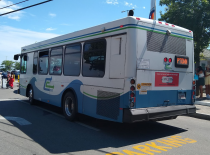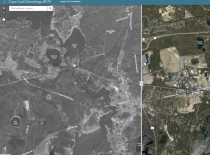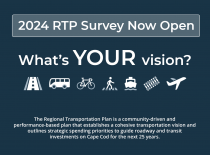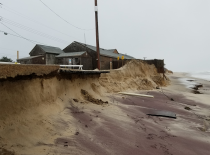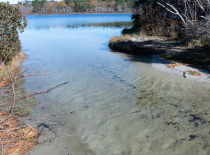All Posts
Transportation accounts for 55% of greenhouse gas (GHG) emissions produced on Cape Cod. While riding public transit is a way to reduce GHG emissions from personal vehicles, a fleet of zero-emissions buses could further reduce emissions – which the Cape Cod Regional Transit Authority (CCRTA) hopes to accomplish. The Commission is working with the CCRTA on a nine-month study to explore transitioning to a zero-emission fleet.
The Cape Cod Ponds Network convened for the fourth time in February 2023. Nearly 70 people dedicated to and interested in improving and maintaining the quality of our region's ponds and lakes attended to learn more about communication and outreach efforts ponds groups can take to educate, inform, and engage citizens.
The Cape Cod Commission's Chronology Viewer enables users to view historic trends and aerial imagery from 1938 to 2020. It has recently been upgraded with a new look, updated data, and an easier-to-use interface.
The Cape Cod Commission has been selected as a digital equity planning provider for the Cape’s 15 communities under the Massachusetts Broadband Institute's Municipal Digital Equity Planning Program. Through this program, the Commission will work with regional stakeholders to identify the community's needs to drive investment and activities to broaden internet access and usage.
The Cape Cod Commission is seeking comments and input from the public to support development of the 2024 Regional Transportation Plan (RTP). An online survey is now open.
The U.S. Army Corps of Engineers, New England District announced that lane restrictions will begin March 20, 2023 on the Sagamore Bridge in order to perform critical maintenance work. Beginning on March 20, 2023, vehicle travel over the Sagamore Bridge will be reduced from the current two lanes in each direction to a single 12-foot-wide lane in each direction. Lane restrictions will be in place 24 hours a day until crews complete the project. Repair work and lane restrictions are scheduled to run through May.
To kick off the Regional Transportation Plan (RTP) development process, a series of Listening Sessions have been scheduled to gather early public input. Each Listening Session will include a presentation and time for questions and comments. The RTP sets the long-range vision for the transportation system on Cape Cod in 2050. It is the primary means for the allocation of federal and state funds for the Cape's transportation needs.
The Cape Cod Commission will host a series of virtual public meetings in the coming weeks in the towns of Barnstable, Bourne, Brewster, Eastham, Truro, and Wellfleet to present conceptual design alternatives created by the Woods Hole Group to address vulnerable low-lying roadway segments, bridges, and culverts.
The Cape Cod Commission is creating a Regional Housing Strategy to address housing supply, affordability, and availability issues by identifying appropriate areas for housing development, along with policies and strategies to further the plan’s goals.
As part of the Freshwater Initiative, the Commission is partnering with the Association to Preserve Cape Cod (APCC) to develop a pond water quality monitoring program.
